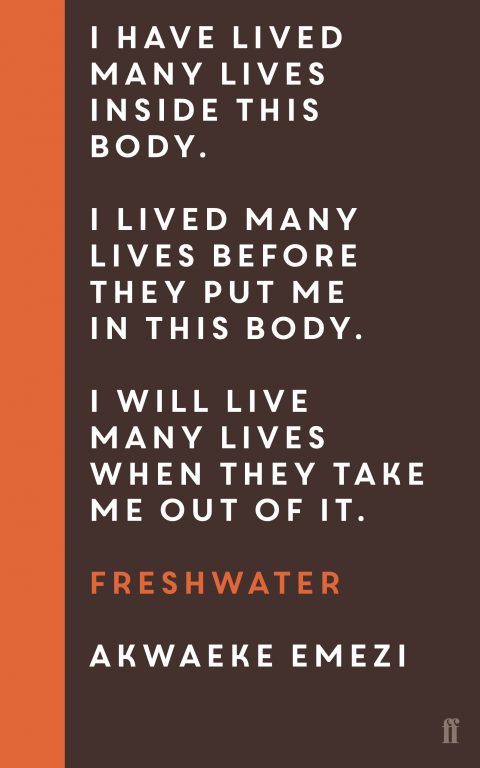We talked with Akwaeke Emezi about their debut novel, Freshwater, a story of spirit selves known as ọgbanje , birthed into a child’s body. From her youth in Aba, Nigeria, to her adult life in America, Ada merges with spirit selves within her after she faces a terrible assault.
Akwaeke Emezi spoke about their writing process, inspiration and who they had in mind when writing.
Read an extract from Akwaeke Emezi’s Freshwater.
Shode:
What inspired the title of your novel?
Emezi:
It comes from an Igbo proverb, ‘All freshwater comes out of the mouth of a python.’ It’s another way of saying that all life comes from the deity Ala, whose avatar is the python.
Shode:
How would you describe your experience and process writing Freshwater?
Emezi:
Honestly? I had several emotional breakdowns while writing it. The novel is autobiographical, so I used my life as a chronological skeleton for the story, which meant revisiting a lot of things that were immensely painful. It was also a process of discovery – I had no outline for Freshwater, no idea how it was going to take shape, but it built itself as I was writing it.
Shode:
How did you learn about the ọgbanje ? Was this through your own personal interest/discovery, or have you had any knowledge given to you by family or friends?
Emezi:
It’s a significant part of Igbo culture, which I was born and raised in.
Shode:
Do you worry about how ọgbanje and Igbo ontology in general will be interpreted by the reader?
Emezi:
I’m painfully aware that I can’t actually control how the reader interprets the work, no matter what kind of guidance I provide. However, it delights me when people engage with the book as a literary work about metaphysics, because that’s very much what I wrote, and I think it’s radical for Igbo ontology to be taken seriously in a world that often invalidates non-Western schools of thought.
Shode:
Did you have an audience in mind? If so, what did you want these readers to experience?
Emezi:
I wrote the book for people like me, who have been inhabiting realities that aren’t considered valid unless they’re pathologized in Western or religious terms as mental illness or demonic possession. I wanted those readers to feel less alone, to know that there are other people living in worlds like these, non-mainstream worlds, and that our worlds are valid. I hoped it would help with the terrible isolation and depression that often comes from having a reality you can’t share with anyone else.
Shode:
You have said elsewhere that your novel is loosely based on your own life; your feelings and experiences of feeling disassociated and isolated. Have you found a space in which you are accepted?
Emezi:
I’ve learnt to build a bubble around myself, one that protects me as much as it can from the violence of being embodied in a world like this, to have people in it who are like me, who understand how important tenderness is to staying alive.
Shode:
Which authors have inspired your writing?
Emezi:
Toni Morrison, for showing me it was okay to write lush sentences. Helen Oyeyemi, for making odd worlds and sharing them, which helped me feel like I could as well. Fran Ross, for challenging me to shatter form. I haven’t done that as well as I know I could, not yet.
Shode:
Which book can you always return to when you are having challenges with your own writing?
Emezi:
When I’m a little stuck, I always go into books that remind me why I love reading stories, why I love writing stories. Terry Pratchett’s Discworld series is full of those, storied worlds to escape into. I wish my other favourite speculative fiction writers would give me forty books in one world! I’d be ecstatic.
Shode:
What advice would you give to those who are just starting their writing journey?
Emezi:
The secret is really to just keep writing, over and over again. Do it as much as you can, and read as much as you can. I think making that part of a disciplined practice helps immensely.
Shode:
What writing practices do you regularly return to?
Emezi:
Daydreaming, actually. I can’t tell you how much of my work was created by telling myself stories in my head during daydreams.
Freshwater by Akwaeke Emezi is out now with Faber in the UK.
Feature image © Elizabeth Wirija








